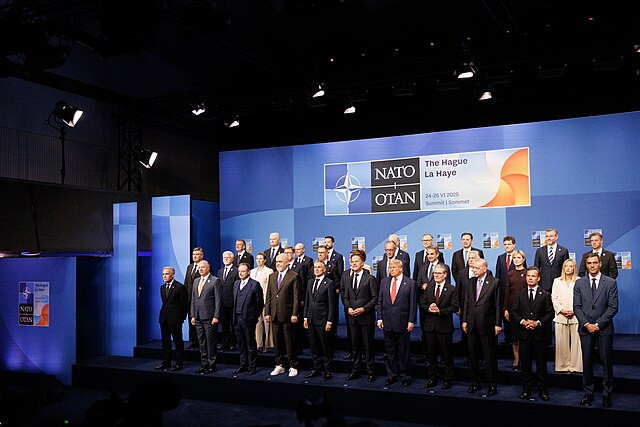NATO leaders on Wednesday agreed to raise defense spending to 5% of gross domestic product by 2035, a sweeping commitment that more than doubles the alliance's prior 2% target and signals a dramatic recalibration of security priorities amid heightened threats from Russia and growing demands from U.S. President Donald Trump.
"Allies commit to invest 5% of GDP annually on core defence requirements as well as defence-and security-related spending by 2035 to ensure our individual and collective obligations," the alliance said in a joint declaration following its summit in the Netherlands. The new threshold includes a minimum of 3.5% dedicated to "pure" defense and another 1.5% for infrastructure and security-related capabilities to bolster civil resilience.
The 32-member bloc emphasized it remained "united in the face of profound security threats and challenges," identifying Russia as a "long-term threat" to Euro-Atlantic security and citing "the persistent threat of terrorism." The statement reaffirmed NATO's core principle of collective defense under Article 5: "An attack on one is an attack on all."
NATO Secretary General Mark Rutte described the new spending pledge as a "quantum leap" in the alliance's posture. "The decisions made today will make NATO much stronger, they also make NATO a fairer alliance," Rutte said. "The resolve of allies is clear: we are in this together, committed to Article 5, and we are determined to stand firm."
Rutte credited Trump with catalyzing the shift. "He deserves all the praise," he said, adding that allies "made significant commitments to meet significant threats."
Trump has long criticized NATO members for what he views as an overreliance on U.S. military capabilities, pressing European and Canadian allies to assume a greater share of the defense burden. The White House had floated the 5% target as early as last year. While most NATO countries still fall short of the prior 2% benchmark agreed in 2014, the new commitment requires annual national plans demonstrating credible paths to compliance.
The agreement came after concerns over the reliability of U.S. commitments to NATO, with Trump previously signaling that his interpretation of Article 5 may diverge from traditional understandings. Those remarks had caused unease among member states, particularly following his more conciliatory posture toward Russian President Vladimir Putin.
While the communique reaffirmed support for Ukraine, it omitted direct condemnation of Russia's ongoing invasion and dropped prior references to Ukraine's "irreversible path" to NATO membership. "Allies reaffirm their enduring sovereign commitments to provide support to Ukraine, whose security contributes to ours," the statement read.
The declaration also stated that contributions toward Ukraine's defense would be included in member states' defense spending calculations.
Spain, one of several countries still below the 2% threshold, said it would sign on to the 5% goal but has not presented a plan for how to reach it. Allies are expected to submit individualized spending plans for annual review.






